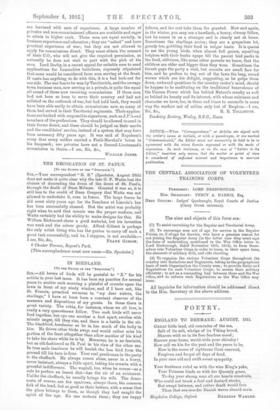IN BIRDLAND.
ITo THE EDITOR Or THE "SPECTATOR."] Sitt,—All lovers of birds will be grateful to " X." for his article in your last issue. It Las been my practice for several years to scatter each morning a plateful of crumbs upon the lawn in front of my study window, and if I have not, like St. Francis, preached sermons to "my dear sisters, the starlings," I have at least been a constant observer of the manners and dispositions of my guests. In these there is great variety. The robin, for instance, whom we all love, is really a very quarrelsome fellow. Two cook birds will never feed together, but eye one another a foot apart, swollen with minute anger, till they rise, and there is a battle in the air. The blackbird, handsome as he is, has much of the bully in him, He drives other birds away, and would rather miss his pertiou of the feast altogether than allow another of his kind to take his share while he is by. Moreover, he is no feminist, but as old-fashioned as St. Paul in his view of the other sex. In true male insolence he will banish the hen bird from the ground till his turn is done. Your real gentleman in the party is the chaffinch. He always comes alone, never in a hurry, never insistent, always a little apart, taking his crumbs with a. graceful indifference. The wagtail, too, when he oomes—as a rule lie prefers an insect diet—has the air of an aristocrat. Unlike the chaffinch, he usually brings his wife. The demo- crats, of course, are the sparrows, always there, the common folk of the land, but as good as their bettors, with a sense that the place belongs to them, as though they had caught the spirit of the age. No one molests them ; they are happy
fellows, and the rest take them for granted. Now and again, in the winter, you may see a hawfinch, a heavy, clumsy fellow, but he comes in as a stranger and is clearly not at home. Sometimes the starlings arrive; they are a gregarious lot, greedy too, gobbling their food in vulgar haste. It is quaint to see the young birds, when almost full grown, squatting helpless with their beaks agape till the parent bird packs in the food, oblivious, like some other parents we know, that the children are older and bigger than they were. Sometimes the thrush pays the party a visit, but crumbs are small fare for him, and he prefers to tug out of the lawn the long, round worms which are his delight, suggesting, as ho gulps them down, awkward questions to the country rector's mind, should he happen to be meditating on the traditional benevolence of the Unseen Power which lies behind Nature's cruelty as well as behind its beauty and its interest, with whose existence and character we have, too, in these sad times to reconcile in some way the warfare not of robins only but of Empires.—I am,


































 Previous page
Previous page